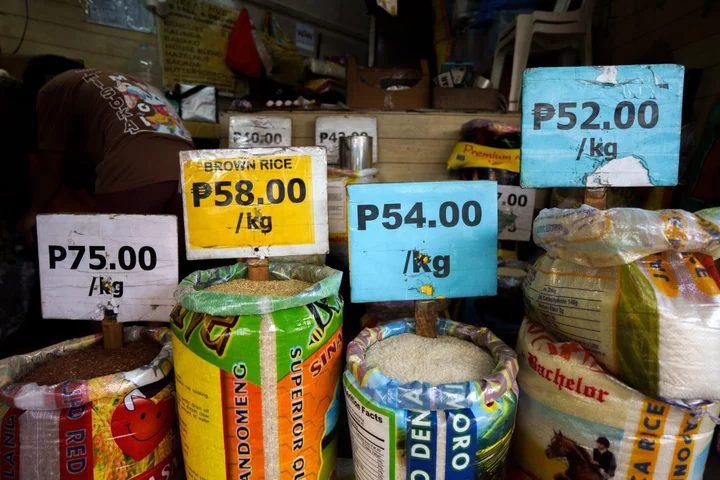Philippine inflation accelerated to the fastest pace in four months in September as rice prices surged, boosting the case for the central bank to resume monetary policy tightening as soon as next month.
Consumer prices rose 6.1% from a year ago, quicker than the 5.3% in August, the statistics agency said on Thursday. The print puts it at the top end of the central bank’s September estimate while all 25 economists surveyed by Bloomberg expected it lower.
Rice inflation soared to 17.9% year-on-year, the fastest pace since March 2009 and more than double the 8.7% in August even after President Ferdinand Marcos Jr. capped rice prices for nearly a month.
The latest print may convince Bangko Sentral ng Pilipinas to extend its most aggressive monetary tightening campaign in two decades after pausing for four straight meetings. Governor Eli Remolona said in an interview last month that he’s open to further raising the policy rate from the current 16-year high of 6.25% on or before the November 16 meeting, should transport and power costs add to price pressures.
“Faster inflation would bolster the more hawkish view for a rate hike, on or even before” next month’s meeting, said Michael Ricafort, chief economist at Rizal Commercial Banking Corp.
The peso rose 0.1% to 56.63 per dollar at 10:32 a.m. local time on Thursday, joining Asian currencies higher, as the dollar’s strength ebbed. The main stock index dropped 0.6%.
What Bloomberg Economics Says...
September’s sharp increase in headline inflation is likely to spur BSP to continue hiking this cycle. Core inflation — though still cooling — remains quite elevated and the pace of deceleration is slow. That increases the risk of secondary spillovers from soaring costs for food and fuel.
—Tamara Mast Henderson, Asean economist
For the full note, click here
Marcos is also under pressure to tamp down inflation, amid lower popularity ratings and growing disapproval towards his government’s handling of price pressures.
He lifted the rice price ceiling on Wednesday after the agriculture department said local prices of the grain have eased by as much as 15% while assuring that his administration is “working very, very hard” to make food costs affordable. A recommendation was made to extend lower rice imports tariff to next year.
Nine-month headline inflation averaged at 6.6%, way above the central bank’s 2%-4% target even as the core gauge cooled for a sixth straight month.
While prices have flared up, policymakers will also have to consider a dimmer outlook for the Southeast Asian nation’s economy this year, after growth stumbled in the second quarter.
Marcos’s team is aiming for the economy to expand by at least 6% this year, but institutions like the International Monetary Fund and the Asian Development Bank see 2023 growth falling below target. Even the BSP expects domestic expansion to slow to 4.9% this year and to 4.5% in 2024.
“A battery of responses should actually take place: forward guidance, liquidity management, and interest rate adjustment if needed,” said Robert Dan Roces, chief economist at Security Bank Corp. in Manila. “The monetary side should be complemented by a fiscal response, including making sure food supply becomes adequate.”
--With assistance from Cliff Venzon, Manolo Serapio Jr., Cecilia Yap and Karl Lester M. Yap.
(Updates with economists’s comments.)

